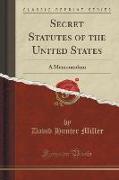Secret Statutes of the United States
BücherAngebote / Angebote:
Excerpt from Secret Statutes of the United States: A Memorandum
It is well known that when acting upon "Executive business, " that is, upon treaties and on nominations to office, the Senate of the United States usually meets with closed doors, although "open Executive sessions, " as they are called, may be held. In this respect the provisions of the Standing Rules of the Senate are as follows:
2. When acting upon confidential or Executive business, unless the same shall be considered in open Executive session, the Senate Chamber shall be cleared of all persons except the Secretary, the Chief Clerk, the Principal Legislative Clerk, the Executive Clerk, the Minute and Journal Clerk, the Sergeant-at-Arms, the Assistant Doorkeeper, and such other officers as the Presiding Officer shall think necessary, and all such officers shall be sworn to secrecy.
3. All confidential communications made by the President of the United States to the Senate shall be by the Senators and the officers of the Senate kept secret, and all treaties which may be laid before the Senate, and all remarks, votes, and proceedings thereon shall also be kept secret, until the Senate shall, by their resolution, take off the injunction of secrecy, or unless the same shall be considered in open Executive session.
(Extract from Standing Rule XXXVI, Senate Rules and Manual, United States, 1913, pp. 32-33.)
Both Houses of Congress, however, may sit with closed doors for discussion of or for proceedings upon business of any character, although there has been no instance of this practice for many years, other than the meetings of the Senate, when acting upon "Executive business."
On a motion made and seconded to close the doors of the Senate, on the discussion of any business which may in the opinion of a Senator, require secrecy, the Presiding Officer shall direct the galleries to be cleared, and during the discussion of such motion the doors shall remain closed. (Standing Rule. XXXV, Senate Rules and Manual. United Slates, 1913, p. 31.)
A rule, not invoked for many years, provides for secret sessions of the House whenever the President may send a confidential message or the Speaker or any Member may announce that he has a confidential communication to present.
Rule XXX provides:
"Whenever confidential communications are received from the President of the United States, or whenever the Speaker or any Member shall inform the House that he has communications which he believes ought to be kept secret for the present, the House shall be cleared of all persons except the Members and officers thereof, and so continue during the reading of such communications, the debates, and proceedings thereon, unless otherwise ordered by the House."
The rule providing for secret sessions of the House dates from February 17, 1792, and December 30, 1793, although secret sessions were held before there was any rule for them. In the revision of 1880 the old rule was retained in an abbreviated form, as the Committee on Rules thought some occasion might arise for its use.
About the Publisher
Forgotten Books publishes hundreds of thousands of rare and classic books. Find more at www.forgottenbooks.com
This book is a reproduction of an important historical work. Forgotten Books uses state-of-the-art technology to digitally reconstruct the work, preserving the original format whilst repairing imperfections present in the aged copy. In rare cases, an imperfection in the original, such as a blemish or missing page, may be replicated in our edition. We do, however, repair the vast majority of imperfections successfully, any imperfections that remain are intentionally left to preserve the state of such historical works.
Folgt in ca. 5 Arbeitstagen
